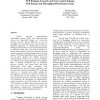Free Online Productivity Tools
i2Speak
i2Symbol
i2OCR
iTex2Img
iWeb2Print
iWeb2Shot
i2Type
iPdf2Split
iPdf2Merge
i2Bopomofo
i2Arabic
i2Style
i2Image
i2PDF
iLatex2Rtf
Sci2ools
ICNP
2000
IEEE
2000
IEEE
TCP-Probing: Towards an Error Control Schema with Energy and Throughput Performance Gains
Today’s universal communications increasingly involve mobile and battery-powered devices (e.g. hand-held, laptop) over wired and wireless networks. Energy efficiency, as well as throughput, are becoming service characteristics of dominant importance in communication protocols. Although standard TCP versions lack the functionality to efficiently adjust their error-control strategies to distinct characteristics of network environments and to specific constraints of communicating devices, the wide range of TCP-based applications have rendered TCP the de facto standard for reliable end-to-end communications. In this work we propose “grafting” two components of strategic significance onto standard TCP: a Probing mechanism and an Immediate Recovery strategy. Our results show that these enhancements yield higher throughput while maintaining lower levels of energy expenditure, and thus have the potential of promoting TCP’s congestion control to a universal error-control schema for het...
| Added | 31 Jul 2010 |
| Updated | 31 Jul 2010 |
| Type | Conference |
| Year | 2000 |
| Where | ICNP |
| Authors | Vassilios Tsaoussidis, Hussein G. Badr |
Comments (0)

